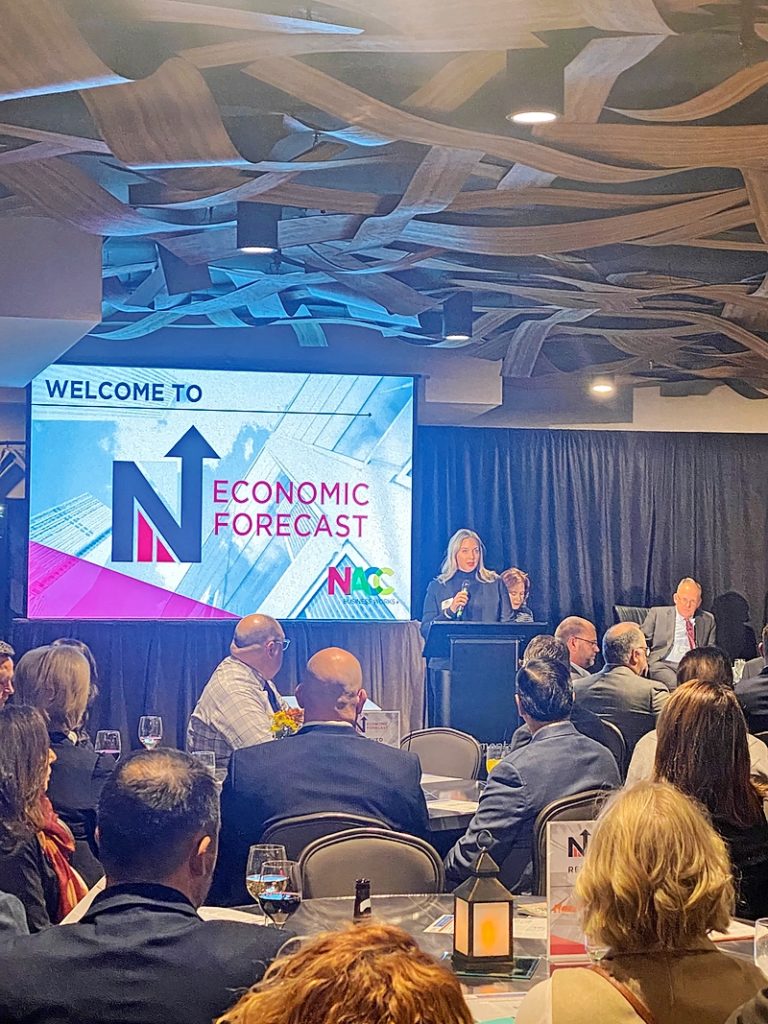Crystal Ball
By Mark Loehrke
January 2023 View more Community
Econ experts converge on Naperville to size up 2023

While there are plenty of things to debate about the 2022 economy, one thing that almost everyone can agree on is that it was anything but boring. Rampant inflation. Wild stock market swings. Soaring interest rates.
With all of that in the rearview mirror—and with little clear consensus on the road ahead—it’s no wonder the room was packed in mid-November when the Naperville Area Chamber of Commerce hosted its 15th annual economic forecast at Elements on Water Street. Moderated by personal finance guru Terry Savage, this year’s panelists covered everything from the broad economic outlook to personal finance developments to the legislative prospects for the year ahead (hint: don’t get your hopes up), with local business leaders eager for some clarity on what might be in store for 2023.
A September 2022 economic outlook report from PNC included the results of a survey showing that 69 percent of small and midmarket business owners believe a recession is very or somewhat likely in the next 12 months. And panelist Gus Faucher, chief economist for the PNC Financial Services Group, said those survey respondents probably aren’t wrong. “We do expect a mild recession in 2023, starting in the spring and continuing through the end of the year—it’s not a sure thing, but I’d put the probability at about two-thirds,” Faucher explained. “That said, banks are in good shape, the financial markets are in pretty good shape, and consumers don’t seem as concerned as they have been in previous cycles, all of which suggests that it should be a mild one.”
When it comes to inflation, meanwhile, and particularly how the Federal Reserve will (and to what degree) continue to use interest rates to contain it, panelist Curtis Dubay, senior economist in the economic policy division at the U.S. Chamber of Commerce, said it’s an open question. “The Fed will only take its foot off the brake pedal once it’s absolutely certain that inflation is completely tamped down,” he noted. “But what is that point? Determining that is a lot more art than science.”
One thing that was a little bit clearer just days removed from the conclusion of the bitterly contentious 2022 midterms—but not necessarily any more encouraging—was the not-so-rosy legislative outlook. “Welcome to the 2024 election cycle,” said panelist Caroline Harris, partner at Capitol Tax Partners LLP and former vice president of tax policy and chief tax policy counselor for the U.S. Chamber of Commerce. “I see a lot of gridlock over the next two years and, unfortunately, I don’t think we’re going to be free from those political commercials for very long.”
As for economic matters that hit closer to home, panelist Randy Bruns, founder and principal of Naperville-based Model Wealth, Inc., talked about the biggest gaps in personal finance—which aren’t necessarily what most people would think. “The greatest risk in financial planning isn’t the stock or bond market—it’s the things we overlook,” he explained. “It’s amazing, for example, how many people don’t have estate plans. It’s not that they don’t care about their families, it’s just not a topic that many people like to think or talk about. Life insurance, long-term care insurance, long-term disability insurance—these are all things that a lot of people overlook that can blow up even the best financial plan.”
Photos courtesy of Kelli Keyszers


